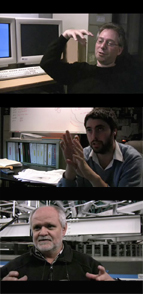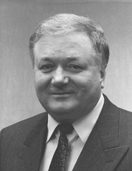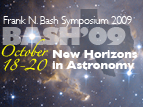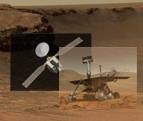Astronomy Program News & Events
see also: McDonald Observatory press room / archive
2009

Daily Texan feature by Hudson Lockett
26 October 2009
Far above the desert landscape of West Texas, the Milky Way dominated the night sky. Six astronomers huddled around a cluster of glowing monitors, wrapping up a six-day test run for a $34 million experiment that will keep the McDonald Observatory's largest telescope busy for three years, probing the mysteries of dark energy. "There's a lot riding on this," said principal investigator Gary Hill early Sunday morning. The final version of the Hobby-Eberly Telescope Dark Energy Experiment will measure the effect of dark energy on the universe by surveying 100 million galaxies, making the largest-ever map of the universe in the process.
Texas Cosmology Network Meeting 2009 Begins Thursday, October 29 on the Austin Campus

26 October 2009
Cosmologists from Texas research institutions will meet Thursday and Friday, October 29 & 30, at the AT&T Conference Center [map], on the Austin campus of The University of Texas, for the second Texas Cosmology Network Meeting. A new Cosmology program at Texas A&M was joined earlier this year by the opening of the Texas Cosmology Center in Austin. Participants from UT Dallas, Baylor, Southern Methodist University, and the University of Houston will consider four broad focus areas: the early universe (inflation), dark energy, dark matter and structure formation in the universe. The meeting is organized by the Texas Cosmology Center, which is supported by The University of Texas at Austin, the College of Natural Sciences, the Department of Astronomy, Department of Physics, and the McDonald Observatory.
2009 Antoinette de Vaucouleurs Lectureship Honors Russian Astronomer Rashid Sunyaev

22 October 2009
Awarded each year to an outstanding astronomer for a lifetime of dedication to astronomy, the 2009 Antoinette de Vaucouleurs Lectureship honors the distinguished Russian astrophysicist Rashid Alievich Sunyaev (translit.-"Syunyaev"). Among the essential tools of modern astrophysics, Dr. Sunyaev's work includes the standard model of disk accretion onto black holes, and the Sunyaev-Zel’dovich (SZ) effect, the scattering interaction of low energy Cosmic Microwave Background photons with high energy photons found in the gas associated with galaxy clusters. The SZ effect opened the possibility of determining fundamental cosmological parameters, the nature of density fluctuations in the early universe, the role of dark energy, and of measuring the hubble constant. A highlight of award events will be the public lecture by Dr. Sunyaev, "The Richness and Beauty of the Physics of Cosmological Recombination," Tuesday, October 27 at 7:00 PM in ACES 2.302.
Third Biennial Frank N. Bash Symposium, New Horizons in Astronomy, Begins Oct. 18

12 October 2009
The University of Texas Department of Astronomy and McDonald Observatory will be hosting the third biennial Frank N. Bash Symposium on the topic of New Horizons in Astronomy, October 18-20, 2009 in the Avaya Auditorium, ACES 2.302, on the Austin campus [map] . The meeting brings together young researchers at the cutting edge of astronomy and astrophysics, to promote the exchange of research ideas and visions for the future of astronomy. This year's meeting will include talks on cosmology, high energy astrophysics, instrumentation, planet formation and more. The symposium is made possible by the contributions of The University of Texas at Austin McDonald Observatory and Department of Astronomy Board of Visitors.
University of Texas Planetary Science Symposium Brings Together Researchers Across Disciplines

25 September 2009
Geologists, Aerospace Engineers, and Astronomers are among University of Texas researchers meeting Friday, October 2, in the Avaya Auditorium, on the Austin campus, for the University of Texas Planetary Science Symposium. The meeting is designed to introduce planetary scientists to one another, and to help foster new, interdisciplinary collaborations, courses and seminars. An overfull schedule of 27 speakers will feature short talks on current research in Solar System Exploration and Techniques, Planet Formation and Evolution, AstroGeoBiology, and Extrasolar Planets. The meeting is co-sponsored by The University of Texas at Austin Jackson School of Geosciences and Department of Astronomy.
Blanc, Jeong, Murphy Win Departmental Awards, Shen Wins Award from China
20 May 2009
For outstanding service to the department, Guillermo Blanc has won the Fred Goetting Memorial Endowed Presidential Scholarship for 2009-2010. For excellence in research, Donghui Jeong, has been awarded the David Benfield Memorial Scholarship in Astronomy. The Frank Edmonds Memorial Fellowship, supporting promising researchers, is awarded to Jeremy Murphy. At the Chinese Consulate in Houston, the 2008 Chinese Government Scholarship for Outstanding Self-financed Students Studying Abroad was awarded to Rongfeng Shen, for sound achievement and performance in study. The Chinese award was extended to 305 recipients in 30 countries
Tim Weinzirl Among Astronomy Award Winners with Best Master's Thesis
14 May 2009
From a field of several hundred, Tim Weinzirl is the prize winner for best Master's Thesis across the College of Natural Sciences and College of Engineering. "Constraints on the Origin of Bulges in Hierarchical Models " [arXiv:0807.0040v3] has been recently published in the Astrophysical Journal. Graduate students Guillermo Blanc, Irina Marinova, and Josh Adams each have won graduate school continuing fellowships for 2009-2010. Undergraduate Krista Smith has received the United Space Alliance Award for Excellence in Astronomy Research at the College of Natural Sciences 2009 Research Forum, and undergraduate Aditi Raye Allen has won the Floy Agnew Endowed Presidential Scholarship.
Joyce Byun, Krista Smith, Andy Liao and Aditi Raye Allen Win 2009 Undergraduate Awards
15 April 2009
The 2009 Outstanding Senior award, for overall performance (grades, research, and service) to a graduating senior, has been awarded to Joyce Byun. For excellent overall performance to a current or entering senior, Krista Smith has won the Board of Visitors scholarship. The Karl G. Henize endowed scholarship for excellent academic performance in the 2nd year and beyond, has been jointly awarded to Andy Liao and Aditi Raye Allen. Prize winners are selected each year by the Undergraduate Studies Executive Committee, following a call for nominations.
HETDEX Workshop to be held February 17-18

11 February 2009
The HETDEX Workshop will be held Tuesday and Wednesday, February 17-18 at the Union Building (UNB) [map], on the campus of The University of Texas at Austin. New instruments and upgrades to the Hobby-Eberly Telescope are currently under way for the Hobby-Eberly Telescope Dark Energy Experiment (HETDEX). The new capablities will create opportunities to probe important questions in astrophysics outside of the primary objective of dark energy. Astronomers and engineers from participating HETDEX institutions will develop science cases to determine whether and how current design plans might be adjusted to take advantage of the new possibilities.
Public Lecture: Frontiers in Cosmology
30 January 2009
Dr. Eiichiro Komatsu, Assoc. Professor and Director of the Texas Cosmology Center, will present the public lecture "Frontiers in Cosmology," Saturday, February 7, at 1:00PM, in the Avaya Auditorium ACE(S) 2.302 [map]. Dr. Komatsu will discuss both the astounding advances of the last decade—quantifying the age, energy and matter of the Universe—and the new, daunting questions: What is Dark Matter and Dark Energy? What powered the Big Bang? Dr. Komatsu is a member of NASA's WMAP science team, and a contributor to HETDEX, the Hobby-Eberly Telescope Dark Energy Experiment. The Great Lectures in Astronomy public series is sponsored by the The University of Texas at Austin McDonald Observatory and Department of Astronomy Board of Visitors.
Second GMT High Resolution Spectroscopy Workshop to be held January 16-17

7 January 2009
The Second GMT High Resolution Spectroscopy Workshop will be held Friday and Saturday, January 16-17, in ACE(S) 2.402 [map], on the campus of The University of Texas at Austin. The meeting will address the scientific problems involved creating high resolution visible and near infrared spectroscopic instruments for the Giant Magellan Telescope (GMT). Scheduled for completion around 2017 at Las Campanas, Chile, the 24.5-meter GMT will be the largest telescope ever built, producing images exceeding the resolution of Hubble Space Telescope. Astronomers and instrument builders from 11 institutions on 3 continents are scheduled to attend.
